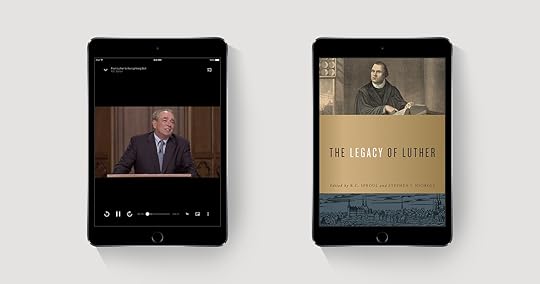R.C. Sproul's Blog, page 113
November 1, 2019
Theology Learned in the Flames of Adversity

In 1527, Martin Luther experienced a trial so severe that church historian Philip Schaff described that year simply as “the disastrous year.” It was the time of Luther’s “severest spiritual and physical trials.” As the leading figure of the Reformation, Luther paid a high price in the struggle for truth, and his physical condition deteriorated under the movement’s mounting demands. On April 22, 1527, Luther was so overcome by dizziness in the pulpit that he stopped preaching and was forced to retire. Other physical problems followed for the Reformer, including severe heart problems, digestive ailments, and fainting spells. He also began to wear down emotionally, suffering bouts of discouragement and depression.
On July 6, another attack struck Luther. He was entertaining friends for dinner when he felt an intense buzzing in his left ear. He had to be carried to bed, where he frantically called for water or else, he believed, he would die. Luther became so chilled that he was convinced he had seen his last night. In a desperate prayer, he surrendered himself to the will of God and prepared to meet his Maker. Though Luther remained seriously ill for days, he eventually regained his strength.
In August, the Black Plague rapidly spread among the people in Wittenberg. Many died, and others fled for their lives. The University of Wittenberg moved to Jena, Germany. Frederick urged Luther to escape to spare his own life. Adding to the danger, Katie was pregnant and they had a one-year-old child, Hans. Luther, however, considered it his moral duty to remain and minister to the sick.
Weighty trials rested heavily upon Luther’s shoulders. Death surrounded him on every side. He watched people die in his house and in the streets. He chose to transform his spacious house into a hospital to care for those suffering from the plague. Hans became desperately ill, and Luther became so heavily burdened that he could not eat for eleven days. He was deeply concerned for Katie’s safety and grew weak with despair.
In a letter to his trusted friend and coworker Philip Melanchthon, Luther acknowledged his increasing bouts of depression:
I spent more than a week in death and in hell. My entire body was in pain, and I still tremble. Completely abandoned by Christ, I labored under the vacillations and storms of desperation and blasphemy against God. But through the prayers of the saints God began to have mercy on me and pulled my soul from the inferno below.
In November, Luther wrote a theological tract titled Whether One May Flee from a Deadly Plague. He argued that a spiritual leader must stay with the community of believers under his care during a time of extreme duress. Certainly, the outbreak of the plague qualified as such a crisis, as extreme stress weighed heavy upon his heart and drained his body of strength. But in his weakness, Luther found new strength in God.
During these difficult years filled with controversy, death, and trial, Luther penned his most famous hymn, “A Mighty Fortress Is Our God.” This magnificent work is based on Psalm 46, a worship song of unshakable trust in God. For years, Luther had translated and taught the Psalms, a book he deeply loved. This inspired collection of ancient worship songs was, in fact, the first book of Scripture that Luther had taught in the classroom. An exposition of selected penitential psalms was the subject of his first printed work.
In hard times, when Luther often found himself terribly discouraged and downcast, he would turn to Melanchthon and say, “Come, Philipp, let us sing the forty-sixth Psalm.” They would sing it in Luther’s original version:
A sure stronghold our God is He, A timely shield and weapon:
Our help He’ll be and set us free From every ill can happen.
Concerning the singing of this favorite psalm, Luther said:
We sing this psalm to the praise of God, because God is with us and powerfully and miraculously preserves and defends His church and His word against all fanatical spirits, against the gates of hell, against the implacable hatred of the devil, and against all the assaults of the world, the flesh and sin.
Out of Luther’s dark distress shined this brightest light of confidence in God. Philip Schaff marvels that this monumental hymn could issue from such deep travails, saying, “The deepest griefs and highest faith often meet.” This was the case with Luther, as “A Mighty Fortress Is Our God” was “born of deep tribulation and conquering faith.”
The 1520s proved to be a turbulent time for Martin Luther, one in which he found himself engaged in many battles. In the face of mounting struggles, Luther fought the good fight and remained unwavering in his devotion to the truth of the Bible. Through these sufferings, he grew deeper in the truth and stronger in faith.
Luther recognized that these conflicts came by divine design to make him the theologian God desired him to be. In commenting on Psalm 119, the Reformer expressed this conviction when he wrote about what he saw as the correct way to study theology. He affirmed three non-negotiables for learning biblical doctrine: “Here you will find three rules. They are frequently proposed throughout the psalm and thus: Oratio, meditatio, tentatio.” These three Latin words translate as “prayer,” “meditation,” and “trial.” It is this third prerequisite that should arrest our attention. Luther calls tentatio “the touch-stone” for learning the truth.
Luther believed that trials in the life of any believer, especially a theologian, are necessary in order to grow in the truth. He said that affliction “teaches you not only to know and understand, but also to experience how right, how true, how sweet, how lovely, how mighty, how comforting God’s Word is, wisdom beyond all wisdom.” In other words, Luther maintained that theology is not learned only in the safety of a lecture hall, but in the flames of adversity. In fiery trials, one is humbled and broken. It is then that a leader is made most teachable. In difficult times, the illuminating work of the Holy Spirit often shines brightest. Broken hearts make for receptive minds.
Such affliction increases in intensity as the servant of God ministers the Word. Luther explained, “As soon as God’s Word takes root and grows in you, the devil will harry you, and will make a real doctor of you, and by his assaults will teach you to seek and love God’s Word.” Luther thanked the devil and papists for “beating, oppressing and distressing” him to the point that they turned him into “a fairly good theologian.”
Amid his mounting conflicts, Luther stands as a towering example of the steadfast loyalty to the gospel that is required by God. Ministry is never without its difficulties. There are no easy places to serve the Lord. In perilous times, Luther demonstrated the unwavering devotion needed to persevere.
This excerpt is adapted from Steven Lawson's contribution Legacy of Luther edited by R.C. Sproul and Stephen Nichols.


October 31, 2019
A Blind Man in a Bell Tower
Martin Luther didn’t intend to start the Reformation. In this brief clip, R.C. Sproul explains how Luther’s 95 Theses spread across Germany and sparked a chain of events he never saw coming.
This Reformation Month, watch a short video every day on the history and insights of the Protestant Reformation. And don't forget that today is the last day you can request your free digital download of R.C. Sproul’s video teaching series Luther and the Reformation plus the ebook edition of The Legacy of Luther, edited by R.C. Sproul and Stephen Nichols at ligm.in/Reformation. Offer ends October 31, 2019.
Transcript
The 95 Theses were written in Latin. That's a key point. Because when he attached them to the church door at Wittenburg, he wasn't doing violence to the church. That was the bulletin board where announcements were made, and invitations were given to the faculty for academic discussions among themselves. So what Luther was proposing was a serious scholarly discussion about the whole structure of the indulgence system. What happened without Luther's permission and without his knowledge, some students say the 95 Theses translated them into German and took advantage of the printing press. And within two weeks they were in every village and hamlet throughout Germany, and this huge uproar took place. Karl Barth makes the observation that Luther, when he posted the 95 Theses, was like a blind man climbing a tower in the church, in the bell tower. He began to lose his balance, and he reached out to grab something to stabilize himself but what he grabbed in his blindness was the rope for the church bell and accidentally awakened the whole town by the ringing of the bells.


Special Sale: Over 100 Resources for $5 Each

More than one hundred trustworthy DVDs, books, CDs, digital downloads, and study guides are available for $5 each. This special Reformation Week collection includes the following titles (and many more) while supplies last.
Don’t miss this special Reformation Week sale. While supplies last.
BROWSE SALE ITEMS NOW
Sale ends 11:59 p.m. ET November 1, 2019.


What Was the Reformation All About?

Over 500 years ago, a German monk named Martin Luther started a protest that exploded into a worldwide movement. So what was the Protestant Reformation all about? This short video narrated by R.C. Sproul is a tool to help you give an answer. Share it with your family and friends. Also available in Chinese, French, German, Italian, Portuguese, and Spanish.
This Reformation Month, watch a short video every day on the history and insights of the Protestant Reformation. And don't forget that for this month only, you can request your free digital download of R.C. Sproul’s video teaching series Luther and the Reformation plus the ebook edition of The Legacy of Luther, edited by R.C. Sproul and Stephen Nichols at ligm.in/Reformation. Offer ends October 31, 2019.
Transcript
500 years ago, a German monk named Martin Luther started a protest that exploded into worldwide movement. At that time, Europe lived in the shadow of the Roman Catholic Church. It was more like an empire than a church. It crowned and cast down kings, and used its dominance to keep people in the darkness of superstition. That sounds pretty unfamiliar.
But in some ways, Luther’s day was very much like our own. Just like today, everyone had an opinion about the Bible even though almost no one had actually read it. Like so many of us, they were trusting the thought-leaders and taste-makers of their day to tell them what was in the Bible and whether or not to believe it. Luther was one of the very few people actually reading the Bible, and what he found was earth-shattering. Even though he was a monk, Luther hated the God of the Bible. But when he studied it, the world around him began to make sense. God made sense. The significance of Jesus became clear to him. He discovered the answer to his deepest question: how could evil be overcome? Specifically, how could his own evil—his own sin—be dealt with?
Luther discovered that he couldn’t do anything to fix this problem himself. He had to rely on the finished work of Christ alone. Luther had discovered a central truth. It changed his life. It changed the world. The Protestant Reformation was about two things. It was about who can say what’s true and it was about how to reconcile who we are with who God is. It recognized that God’s Word is the ultimate authority in this world, and that the perfect life and sacrificial death of Jesus Christ are the only answer for evil and the only basis on which sinners can stand before a holy God. The Protestant Reformation is a story of transformation—a transformation from hate to love, from slavery to freedom, and from blind faith to a glorious discovery of the truth in Jesus Christ.
Ligonier Ministries exists to cultivate this transformation in a new generation. In a day when few are reading the Bible, and when confusion reigns in the church, we want to help Christians know what they believe, why they believe it, how to live it, and how to share it. Join us.


October 30, 2019
What Is Reformation Day?

A single event on a single day changed the world. It was October 31, 1517. Brother Martin, a monk and a scholar, had struggled for years with his church, the church in Rome. He had been greatly disturbed by an unprecedented indulgence sale. The story has all the makings of a Hollywood blockbuster. Let's meet the cast.
First, there is the young bishop—too young by church laws—Albert of Mainz. Not only was he bishop over two bishoprics, he desired an additional archbishopric over Mainz. This too was against church laws. So Albert appealed to the Pope in Rome, Leo X. From the De Medici family, Leo X greedily allowed his tastes to exceed his financial resources. Enter the artists and sculptors, Raphael and Michelangelo.
When Albert of Mainz appealed for a papal dispensation, Leo X was ready to deal. Albert, with the papal blessing, would sell indulgences for past, present, and future sins. All of this sickened the monk, Martin Luther. Can we buy our way into heaven? Luther had to speak out.
But why October 31? November 1 held a special place in the church calendar as All Saints' Day. On November 1, 1517, a massive exhibit of newly acquired relics would be on display at Wittenberg, Luther's home city. Pilgrims would come from all over, genuflect before the relics, and take hundreds, if not thousands, of years off time in purgatory. Luther's soul grew even more vexed. None of this seemed right.
Martin Luther, a scholar, took quill in hand, dipped it in his inkwell and penned his 95 Theses on October 31, 1517. These were intended to spark a debate, to stir some soul-searching among his fellow brothers in the church. The 95 Theses sparked far more than a debate. The 95 Theses also revealed the church was far beyond rehabilitation. It needed a reformation. The church, and the world, would never be the same.
One of Luther's 95 Theses simply declares, "The Church's true treasure is the gospel of Jesus Christ." That alone is the meaning of Reformation Day. The church had lost sight of the gospel because it had long ago papered over the pages of God's Word with layer upon layer of tradition. Tradition always brings about systems of works, of earning your way back to God. It was true of the Pharisees, and it was true of medieval Roman Catholicism. Didn't Christ Himself say, "My yoke is easy and my burden is light?" Reformation Day celebrates the joyful beauty of the liberating gospel of Jesus Christ.
What is Reformation Day? It is the day the light of the gospel broke forth out of darkness. It was the day that began the Protestant Reformation. It was a day that led to Martin Luther, John Calvin, John Knox, and may other Reformers helping the church find its way back to God's Word as the only authority for faith and life and leading the church back to the glorious doctrines of justification by grace alone through faith alone in Christ alone. It kindled the fires of missionary endeavors, it led to hymn writing and congregational singing, and it led to the centrality of the sermon and preaching for the people of God. It is the celebration of a theological, ecclesiastical, and cultural transformation.
So we celebrate Reformation Day. This day reminds us to be thankful for our past and to the Monk turned Reformer. What's more, this day reminds us of our duty, our obligation, to keep the light of the gospel at the center of all we do.


Ask Ligonier with John MacArthur: Live Tuesday at 7:30 p.m. ET

On Tuesday, November 5 at 7:30 p.m. ET, Dr. John MacArthur will join us as a special guest on our Ask Ligonier team to answer your biblical and theological questions live online.
Dr. MacArthur has been pastor-teacher of Grace Community Church in Sun Valley, Calif., for the past fifty years. He is the featured teacher on Grace to You, and he has written numerous books, including None Other, Good News, and Final Word.
Simply tweet us your questions by using the hashtag #AskLigonier or leave them as comments or messages on our Facebook page. This special online event will be streamed live on Ligonier’s blog, YouTube, Facebook, and Twitter. We hope you’ll join us Tuesday.


Don’t Miss Your Two Free Reformation Resources

Don’t miss this opportunity to receive two free Reformation resources that can help you get to know Martin Luther’s life, teaching, and enduring influence.
Request your digital download of R.C. Sproul’s video teaching series Luther and the Reformation plus the ebook The Legacy of Luther, edited by R.C. Sproul and Stephen Nichols. Discover what led Luther to make a courageous stand for the gospel in the sixteenth century, and be encouraged to stand for the truth of God’s Word today.
Claim your two free resources
This offer expires October 31, 2019.


The Five Solas
We’re saved by grace alone, through faith alone, in Christ alone, as revealed in Scripture alone, to the glory of God alone. In this brief clip, R.C. Sproul walks us through the five solas of the Reformation.
This Reformation Month, watch a short video every day on the history and insights of the Protestant Reformation. And don't forget that for a donation of any amount this month only, you can also receive a copy of Luther: The Life and Legacy of the German Reformer, a documentary featuring interviews with R.C. Sproul and several Ligonier Teaching Fellows, on DVD. Offer ends 10/31/18.
Throughout the “Solas,” the accent is on the qualifier alone. The created world is called to reflect the glory of God. The very fact that God makes a creature places that creature in debt to the Creator. And the only reason you exist and that I exist is for Him. There's nothing inherently dignified about dirt, and that's what we've been made from. The reason why you count is because God says you count. And the whole world is full of His glory. Only God can bind the conscience absolutely. The peasant armed with one verse of Scripture has more authority than a pope or a church council who does not have Scripture. This is crossed out by the Reformers. This is crossed out by the Reformers. And my inherent righteousness is crossed out. So that you have faith alone, grace alone, Christ alone. The divine prerogative for mercy and grace is "I will have mercy on whom I will have mercy." That's His prerogative. God does not owe saving grace to anybody.
I talked to my Arminian friends all the time about this and say, "look, let me ask you a question. Why is it you're a believer, and many members of your own family or friends that you have are not believers when you both heard the gospel?" Jesus doesn't say no man can come to him unless God helps it. He says no man can come to Him unless God, in fact, gives it to him. No one is saved just because they affirmed the doctrine of justification. What happens if you deny the doctrine of justification by faith alone? Now that's a different matter because now you're denying that you're saved by Christ and by Christ alone, and that denial may be enough to damn you. Christ alone merits salvation in front of a just and holy God. Because He's the only one who is sinless. The whole doctrine of justification by faith, the whole doctrine of salvation by grace rests on the principle that the law of God has been fulfilled by Christ. When I put my trust in Him, He computes or counts to me His righteousness. And on the basis of that imputed righteousness, God declares me just right now. So if I die right now, I go to heaven right now, because I have all the righteousness I will ever need to get there—namely the righteousness of Jesus Christ. That's good news. You reject that you're rejecting the gospel.


Subscribe to Ligonier Connect for 12 Months and Pay for Only 10

Who has ultimate authority in the church? How can we be made right with God? These questions reverberated throughout medieval Europe, resulting in the Protestant Reformation. After centuries of darkness, the light of the gospel was recovered. Like the Reformers discovered five centuries ago, we have every reason to celebrate the grace of God revealed in His Word today.
With a year-long subscription to Ligonier Connect, you gain complete access to our library of interactive video courses. Subscribe today and get twelve months of access for the price of ten.
Deepen your understanding of the Reformation with courses like these:
Luther & the Reformation from R.C. Sproul explores how God used Martin Luther’s rediscovery of the true gospel to ignite the Reformation.
Reformation Truths from Michael Reeves gives doctrinal clarity by contrasting Reformation theology with the teachings of the Roman Catholic Church.
Justified by Faith Alone from R.C. Sproul presents the central doctrine recovered in the Reformation, answering the question, “What must I do to be saved?”
Reformation Profiles from Stephen Nichols follows the events of the Reformation from the perspective of important figures in four key countries.
The Puritans & the Reformation from Michael Reeves surveys the Reformation in the English-speaking world and major figures who helped shape it.
Purchase your twelve-month subscription today at the price of ten months to save on a year of trustworthy teaching suited to any schedule and learning style.


Justification and God’s Glory
In this brief clip from his new teaching series Reformation Truths, Michael Reeves explains how the Reformation doctrine of justification by faith alone glorifies God.
Transcript
Justification was the matter of the Reformation, and through it God was glorified as utterly merciful and good, as both supremely holy and compassionate. And therefore, people found they could find their comfort and delight in this God. Here, the Reformers saw, is a God who loves failures first, not one who simply approves those who've sorted themselves out. And so, the glory of this God became the root of true satisfaction and joy for believers. It became their guiding light, their ultimate goal. And so here is how Luther, remember the man who once said he hated God, here's how he would come to speak of God in His glory and love.
Luther wrote, "The love of God does not find, but creates that which is pleasing to it. The love of God loves sinners, evil persons, fools and weaklings, in order to make them righteous, good, wise, and strong. Therefore, sinners are attractive because they're loved; they're not loved because they're attractive." He's showing how all this still matters because you will never love God and lean into the Christian life without it. You will not love God unless you know He loves you first. You will not love Him unless you know a security in which to enjoy Him.


R.C. Sproul's Blog
- R.C. Sproul's profile
- 1931 followers



